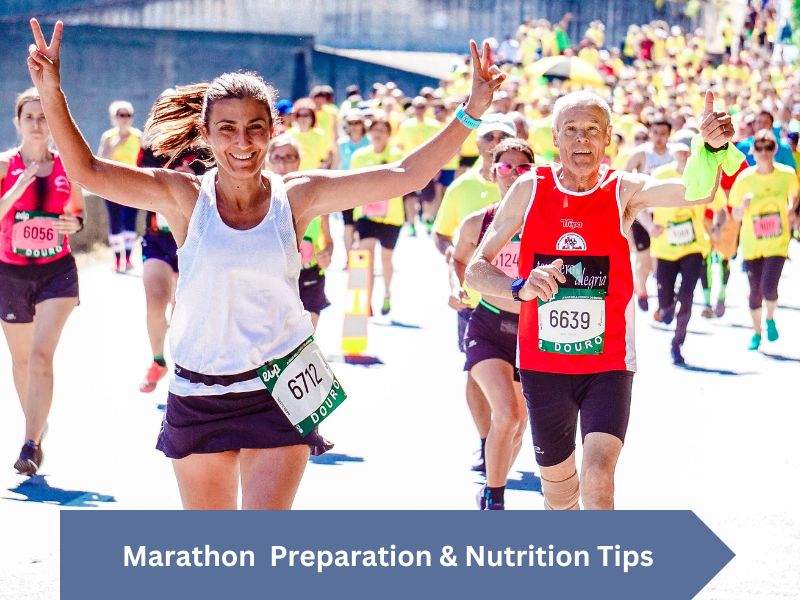No hiding from it, a marathon is a big goal, and it requires proper preparation, especially if it’s your first time. Whether you’re a beginner or already into running, this guide will help you cover everything from nutrition tips to a basic running schedule and ways to recover after a run, to the bone. Follow these simple steps, and you’ll be ready to take on a marathon with confidence!
1. Set a running schedule Helps you get adjusted to a distance gradually that you’d be able to build and avoid injuries with.
Beginning Small: The first case is when someone is fresh; start using short distances, say from 2-3 km every day. Such a way makes your body adjust to your regular exercise.
The Weekly Improvement: You can now add approximately 1km to your longest run each week. For example, if last week you ran 5km, then this week make it 6km and you can keep on adding the kilometers.
Long Runs: Run long distances on weekends, such as 10-12km, or more, depending on your progress. Long runs are very crucial for increasing stamina.
Rest Days: You should have at least two days a week of rest days. Muscles become powerful when rested.
Intervals and Sprints: Try one or two days for intervals or sprints. Sprinting helps improve how you can speed up and develop endurance. Example of doing intervals/sprints: Run fast for 30 seconds, slow to normal pace for 1 minute and repeat 5-10 times.
2. Nutrition Tips for Marathon Training
Nutrition is equal to running. Right kinds of food will give you the energy to improve your performance and help you recover much quicker.
Carbohydrates: This is your basic fuel. You could use rice, bread, pasta, potatoes, or even oatmeal. All whole grains will provide better strength for longer periods, which could be derived from brown rice and whole-wheat bread.
Protein: This will repair and build muscles. Increase protein from food by always having proteins in each meal, for example dal, eggs, chicken, and paneer.
Good fats: Again, we all require fat. Just get healthy foods like nuts and seeds plus avocado as well as using olive oil
Drink Much Water: Train on daily basis throughout the day to ensure it goes in sufficiently. However during runs take at least half an hour break within the hour so you might have at least one of the intervals for half-an-hour breaks so you find water before heading to that route.
Pre-Marathon Nutrition: Have a light meal 1-2 hours prior to your run. The ideal thing would be having a banana with peanut butter or a slice of toast. Avoid heavy, oily or spicy foods like prathe.
Post-Run Nutrition: Take something within 30 minutes after running. That is the time when your body’s recovery process starts. A banana or a smoothie consisting of fruits and yogurt should be a good option
3. Sleep and Rest for Better Performance
Rest is as important as your workouts. Here’s how sleep and rest days help:
Sleep Well: Target 7-8 hours of sleep. Good sleep helps recover muscles and gives you energy.
Listen to Your Body: If you are too tired or feeling sore, skip a run and rest instead. Forcing yourself to run on such days can lead to injuries.
4. Recovery Tips to Avoid Injuries
Recovery is equally important in training. Failure to recover will make the muscles sore, and worst still, you might harm yourself in the process.
Stretching: You are supposed to stretch after every run. Stretching maintains muscle flexibility and minimizes a chance of getting cramp or injury. Foam Rolling: Foam rolling is slightly like giving yourself a massage but light. The procedure does help to ease soreness and increase blood flow towards the muscle.
Ice Baths: Soaking your legs in ice water or using an ice pack may help if you feel achy on your legs after a long run. This will reduce swelling and alleviate pain.
Compression Socks: Some runners have said that compression socks can help reduce muscle soreness, especially if you ran a long race.
5. Taper Before the Marathon
Tapering” means you decrease your mileage before the event so that you can recover. This is usually 2-3 weeks before the marathon since you run a lesser distance so that your body gets ample resting time.
Reduce Mileage: No long runs in the final week. Short runs that work to keep you active not tired out.
Eat Good: Maintain a balanced diet so you are healthy strong for the big day and marathon day tips.
Breakfast: Have some light, high-carb breakfast such as toast with jam or banana. Do not indulge in rich and spicy stuff that will give you tummy trouble.
Warm-up: You would warm up and do some stretching before beginning your run. It gets you all limber.
Run Slowly: Do not begin with a sprinting start. Leave something for the last kilometer.
Keep Drinking Water: Drink at intervals but don’t get carried away. Small gulps work.
After the Marathon
Congratulations, you have just finished a race! Once you are done, pat yourself on the back big time! Recovery after the race is also very important:
Cool Down: Walk around a bit and stretch to cool down your muscles.
Rehydrate: Drink water or sports drink to regain lost fluids.
Post-Race Meal: You can eat a good meal, full of carbs and proteins, like dal-roti-sabzi or pasta with veggies.
Final Words
It is not an easy job, running a marathon is not easy but very fulfilling. If you stick to a routine, eat well, and don’t forget to rest, it will be a breezy run. Every run takes you closer to your goal. With this guide, you have all the basics to prepare well and complete the marathon with a smile!

Leave a Reply